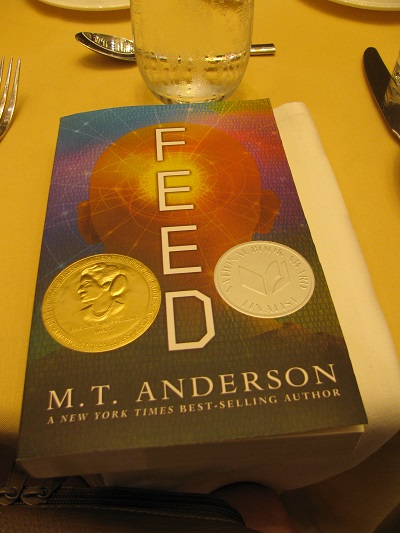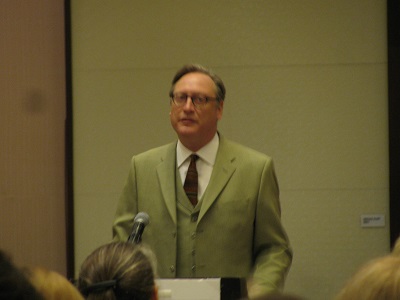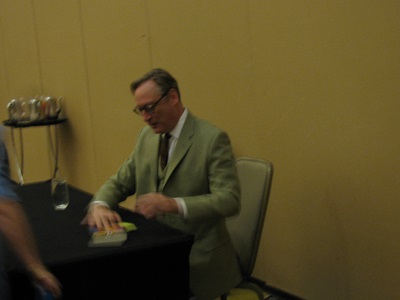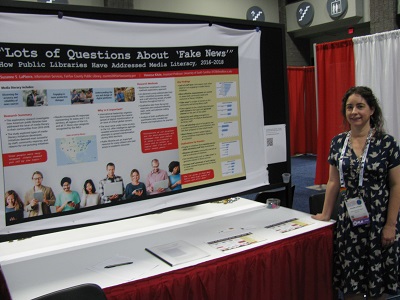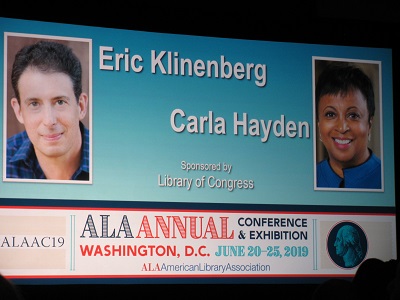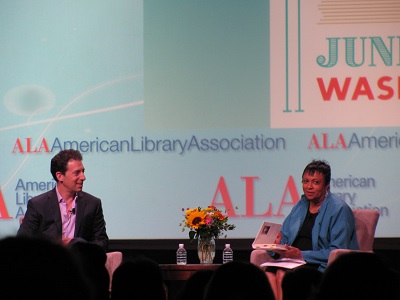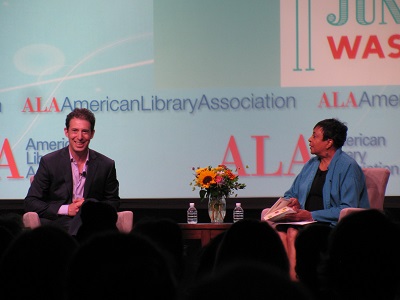After the PLA Member Welcome Breakfast on Saturday, I visited the exhibits and then went to the Margaret Edwards Brunch, where M. T. Anderson was receiving a YALSA award for his books Feed and the two Octavian Nothing books.
At each seat, there was a copy of his book Feed.
Here’s the review of Feed that I wrote in 2003. I will take credit for being sure it would be a future classic! After all, it won the Margaret Edwards Award!
Here are my notes from the talk he gave after the meal:
He began at 22 years old as an office assistant at Candlewick Press.
He has been ahead of several trends by six years: Vampires, dystopian, steampunk… (Soon there should be a trend on nonfiction about World War I.)
It’s a good time to be writing for the young, and his speech was about Hope.
In the past, he’s written to leave the reader with anxiety and even panic. If we want things to be different, we need to do something.
Now he’s filled with hope and fury. There’s hope in action.
The turn of the century (when he started writing) was the time of the Death of Cute. Nothing was allowed to be innocent. The sweet had to bear the wound for the rest of us. The culture was engorged with disillusionment.
Bitter cynicism is often the sign of sensitivity.
The party that denied Darwinism became the party of social Darwinism.
He hopes his work of that period distinguishes itself with compassion.
It was the Age of Spoliation. His worries about that are: It became cliché and it could hurt kids’ sense of wonder.
If none of this has intrinsic meaning, we need to make meaning.
Don’t crush kids’ sense of wonder.
Training in happiness is as important as training in crisis.
We knew things were wrong but were too terrified to act. We were worried that kindness and generosity were a suckers’ belief. We tried to avoid thinking about it.
It’s easier to teach that nothing is good than to confront the bad.
Thirteen years of post-apocalyptic literature have brought us to a time when we don’t need to imagine a dystopian world; we live in one. Even the privileged can’t hide any longer.
The Age of Spoliation was protecting us from admitting the horror is real.
Authors who were eccentric and political in 2005 are now swamped.
The Age of Spoliation is over. Now is the Age of Action.
Teens today know the stakes. Our nation is galvanized and ready for action.
You’re here on this earth for a little while. Together, let’s make this the world you dream of.
Librarians are central in converting cheap cynicism to compassionate action.
Let’s act so the young don’t have to shun the cute, but fight for it.
After his speech, he signed the books we’d been given.
Next, I went to the exhibits and stopped by my co-worker’s poster session!
My next event was to attend the Auditorium Speaker Series with Eric Klinenberg, author of Palaces of the People being interviewed by Librarian of Congress, Carla Hayden.
The book is about social infrastructure. Here are notes on their interview:
Carla Hayden: You included libraries!
Eric Klinenberg: I discovered the library later in life. And the idea of social infrastructure, which is just as important as other infrastructure.
After Hurricane Sandy, they held a design competition, and there was a proposal for a “Resilience Center” — it would be a building in every city across America, staffed with extras, stocked with resources, etc. (The whole room laughed because he described libraries.)
We’re searching everywhere for community. We walk by this place every day.
“The most amazing social infrastructure designers could ever build — it’s called the library.”
“The most extraordinary institution one could imagine is already here, the library.”
A lot of people think every problem needs a new solution. People in elite circles don’t realize all the library does.
We need libraries more than ever, but they’re still under threat.
Local leaders need to take advantage of the commitment of librarians. Think of libraries as essential social infrastructure.
Librarians are a critical part of democratic culture. Libraries are a safety net when social services are cut.
Mayor Pete Buttigieg reviewed his book before anyone had heard of him. How cool is it that a presidential candidate is talking about libraries?
The 2020 census will be online — we need libraries.
Wouldn’t you love to ask all candidates about libraries?
CH: Plant the Library Question! [If you’re ever in a town hall with a presidential candidate, ask them about libraries!]
EK: Libraries help people elevate themselves. The public library is still a place where massive numbers of people are going all the time to make something more of their lives.
He told about Virtual Bowling at Brooklyn Public Library.
Think of how many relationships happen because of the work you do in the library every day.
CH: It helps having someone not part of the library be an advocate.
EK: We need to bring the message to Congress.
The truth is that the library has transformed. The library is dynamic and has modernized.
Across the country, our infrastructure is out of date. Libraries are critical social infrastructure.
In libraries, people have experiences that aren’t pre-scripted. Something about the radical inclusiveness of the library is important.
His book is a story of librarians as much as libraries.
CH: Being a public librarian means you are empowering people.
EK: Librarians are critical actors in a social experiment.
What makes our communities work? When this incredibly powerful institution is there and invested in, things work.
Find language that works well. Shout it from the rooftops.
There’s a growing realization that democratic institutions are at risk.
There are not many places that invite communities to discuss issues together. Tech companies invest millions in social infrastructure. Meaningful social engagement happens in a physical space.
Data don’t speak for themselves. Just throwing numbers doesn’t do the trick.
There are different kinds of data: REcord what’s happening and explain it with qualitative data. After we have the numbers, we have to have a powerful narrative. We are wired for story.
Put together a story, based on good evidence, for why libraries deserve better.
